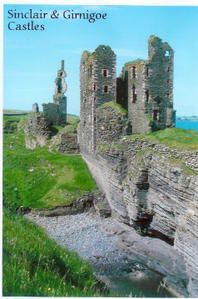Revenons pour l’article d’aujourd’hui à des nouvelles du Ceilidh. Rena, dont il a été souvent question dans ce blog vient de m’envoyer l’article qu’elle a découpé dans le journal
local de Wick : c’est un article signé Leslie Rowe et daté du 28.06.06
“TWENTY-Odd years ago Eric Bertrand came from Brittany to Caithness as a French assistant at Wick and Thurso high schools. While living in the North he borrowed a bike to get around and
became entranced with the history of the county and particularly its castles. He subsequently left Caithness for Aberdeen University, where he became a foreign language assistant and, for
recreation, studied Gaelic. Because of his love of Caithness he bas maintained a strong connection ever since, spending his honeymoon here and returning a number of times over the years, bringing
back his parents and his two young children to visit his favourite haunts.
Now Éric bas written a nouvelle/drame, set in Caithness, entitled Le Ceilidh, with castles as the background to his story. He is not the first writer to use a Caithness castle as the locale
for a book (Mary De Laszlo, in particular, based her novel Breaking the Rules on Keiss Castle) but in Le Ceilidh they play a significant part.
The story features Ronald MacDonald as a theatrical director and writer, and Heather Mackenzie, from Caithness, as an aspiring actress and member of his company. The plot involves a tour of
Shakespeare's Macbeth which finishes in Glasgow. Subsequently Ronald, persuaded by Heather to visit her native county, does so and is captivated by its history and its castles and decides to
write his own free version of Macbeth using Caithness Dames and locations.
His fanciful tale includes a wicked Earl of Caithness, a mysterious "Green Lady", a young woman who throws herself from Ackergill Tower (an echo of Helen of Braemore here) and even a little
hochmagandy in the shadow of Castle Sinclair Girnigoe.
Entitled Le Ceilidh because the freely adapted dramatic version of Macbeth will be performed unheralded in pubs, etc., in towns and villages around the North, the play ends with a Gaelic
lament (for which a French translation is provided).
1 have no idea at what French audience Le Ceilidh is aimed but Éric must have some notion of what he's about since this is his fourth published book.
Rena Oliver, former modern languages teacher at Wick and Thurso high schools, has kept in touch with Erie since his initial stay in Caithness and has kindly provided the background to the
book, but the interpretation of the narrative is my own, with some help from my wife.
Rena is a McLeod by birth and 1 believe Erie bas adopted that clan and wears a kilt of the appropriate tartan on special occasions.”





